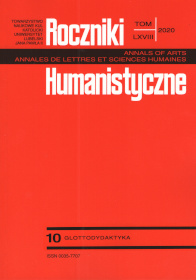The Interpreting Portfolio as a Self-Regulation Tool in Interpreter Training: Preliminary Findings from a Pilot Study
Abstrakt
Portfolio jako narzędzie samoregulacji w kształceniu tłumaczy konferencyjnych: wstępne wnioski z badania pilotażowego
Z uwagi na to, że od profesjonalnych tłumaczy konferencyjnych oczekuje się autonomicznego rozwoju, zadaniem dydaktyków przekładu powinno być przygotowywanie początkujących tłumaczy do rozwoju zawodowego po ukończeniu edukacji formalnej. Jedną z najtrafniejszych koncepcji w tym kontekście jest pojęcie samoregulacji, opisane przez Barbarę Moser-Mercer. Wdrożenie elementów samoregulacji, tj. refleksji nad procesem tłumaczenia oraz poczynionych postępów, praca nad jakością przekładu oraz rozwijanie praktyk profesjonalnego tłumacza konferencyjnego może być ułatwione przez wprowadzenie „indywidualnie dopasowanego narzędzia” (Kiraly 49), umożliwiającego rozwój zarówno w edukacji uniwersyteckiej, jak i po ukończeniu studiów. Niniejszy artykuł przedstawia koncepcję portfolio jako narzędzia wspierającego samoregulację u początkujących tłumaczy konferencyjnych, które umożliwia im dokumentowanie i ocenianie poczynionych postępów, rozwijanie skutecznych strategii umożliwiających dążenie do wyznaczonych celów oraz skłania do refleksji nad procesem przekładu. Otrzymane wyniki oraz pozytywne reakcje zwrotne od studentów biorących udział w badaniu pilotażowym wskazują na wysoką efektywność portfolio w zakresie rozwoju umiejętności samoregulacyjnych u adeptów przekładu konferencyjnego.
Bibliografia
Arumí Ribas, Marta. “Formative Assessment in the Interpreting Classroom: Using the Portfolio with Students Beginning Simultaneous Interpreting.” Current Trends in Translation Teaching and Learning, vol. VIII, ed. Mikel Garant, University of Helsinki, Department of Modern Languages, 2010. http://www.cttl.org/2010-edition.html. Accessed 07.10.2019.
Doran, George T. “There’s a S.M.A.R.T. Way to Write Management’s Goals and Objectives.” Management Review, vol. 70, issue 11, 1981, pp. 35-36.
González Davies, Maria. Multiple Voices in the Translation Classroom: Activities, Tasks and Project. John Benjamins, 2004.
Grow, Gerald. “Teaching Learners to Be Self-Directed.” Adult Education Quarterly, vol. 41, issue 3, 1991. pp. 125-149. doi: 10.1177/0001848191041003001.
Johnson, Julie. “Learning through Portfolios in the Translation Classroom.” Beyond the Ivory Tower Rethinking Translation Pedagogy, ed. Brian James Baer and Geoffrey S. Koby, John Benjamins Publishing Company, 2003.
Kiraly, Don. A Social Constructivist Approach to Translator Education. Empowerment from Theory to Practice. St. Jerome Publishing, 2000.
Klimkowski, Konrad. Towards a Shared Curriculum in Translator and Interpreter Education. Wydawnictwo Wyższej Szkoły Filologicznej we Wrocławiu, 2015.
Klimkowski, Konrad. “Assessment as a Communicative Activity in the Translation Classroom.” inTRAlinea Special Issue: New Insights into Translator Training, ed. Paulina Pietrzak, 2019, http://www.intralinea.org/specials/article/assessment_as_a_communicative_activity_in_the_translation_classroom. Accessed 07.10.2019.
McMillan, James H. Classroom Assessment: Principles and Practice for Effective Instruction. Allyn and Bacon, 1997 .
Moser-Mercer, Barbara. “Skill Acquisition in Interpreting. A Human Performance Perspective.” The Interpreter and Translator Trainer, vol. 2, no. 1, 2008, pp. 1-28.
Pędzisz, Joanna. “Kształcenie tłumacza symultanicznego a trening rozwoju osobistego. O portfolio tłumaczeniowym jako narzędziu wspierającym samopoznanie.” Applied Linguistics Papers, vol. 26, no. 2, 2019, pp. 91-102. doi: 10.32612/uw.25449354.2019.2.
Pietrzak, Paulina. “The Effects of Students’ Self-regulation on Translation Quality.” Babel: International Journal of Translation, vol. 64, no. 5/6, 2018, pp. 819-839. doi: 10.1075/babel. 00064.pie.
Rogers, Jenny. Coaching Skills A Handbook. Open UP, 2008.
Sawyer, David. Fundamental Aspects of Interpreter Education: Curriculum and Assessment. John Benjamins Publishing Company, 2004.
Schraw, Gregory, and Rayne Sperling Dennison. “Assessing metacognitive awareness.” Contemporary Educational Psychology, vol. 19, issue 4, 1994, pp. 460-475. doi: 10.1006/ ceps.1994.1033.
Way, Catherine. “Systematic Assessment of Translator Competence: In Search of Achilles’ Heel.” Translator and Interpreter Training: Issues, Methods and Debates, ed. John Kearns, Continuum, 2008, pp. 88-103.
Copyright (c) 2020 Roczniki Humanistyczne

Utwór dostępny jest na licencji Creative Commons Uznanie autorstwa – Użycie niekomercyjne – Bez utworów zależnych 4.0 Międzynarodowe.





